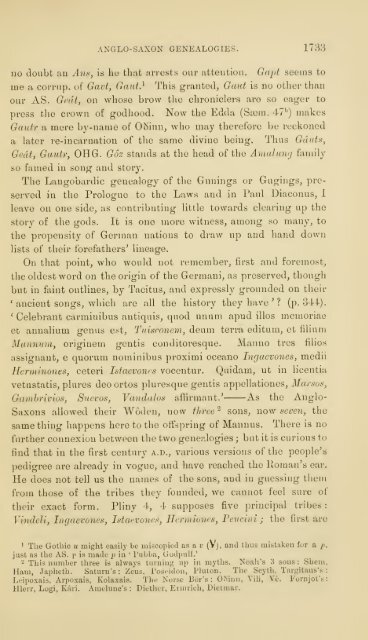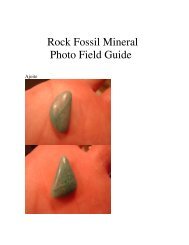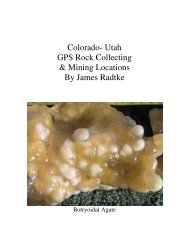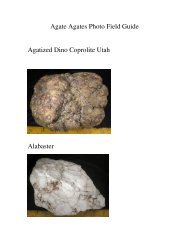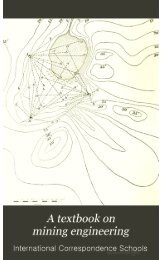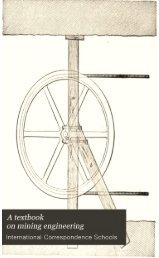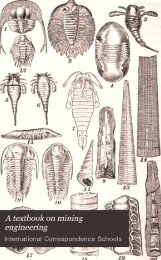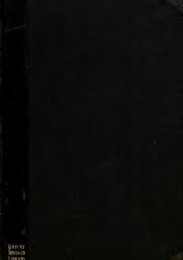- Page 2:
Division _'BL6 fc(D Section...*. §
- Page 9 and 10:
TEUTONIC MYTHOLOGY BY JACOB GRll TR
- Page 11:
CONTENTS. VOL. IV. SUPPLEMENT [Coll
- Page 14 and 15:
1278 INTRODUCTION. trasts the vices
- Page 16 and 17:
1280 INTEODUCTION. now diaholi powj
- Page 18 and 19:
1232 INTRODUCllON. forinnlas : sani
- Page 20 and 21:
1284 INTRODUCTION. among tlie Saxon
- Page 22 and 23:
; 1286 GOD. usually latrjitus, is a
- Page 24 and 25:
1288 GOD. by it : ir sclioenes libe
- Page 26 and 27:
1290 GOD. drieu, damri deu, doiaini
- Page 28 and 29:
1292 GOD. fjbijarfop, fxrjTieTa. '
- Page 30 and 31:
1294 WORSHIP. (Aufrecht and Kirchli
- Page 32 and 33:
; 1296 woESHip. diu wurden scliiere
- Page 34 and 35:
1298 WORSHIP. p. 37 n.] Mit der hlo
- Page 36 and 37:
1300 WORSHIP. p. 42.] Part of tlie
- Page 38 and 39:
1302 WORSHIP. Jiorses and arms of t
- Page 40 and 41:
1304 WORSHIP. cornua cervl, Ov. Met
- Page 42 and 43:
1306 WOESHIP. vati, Somad. 1, 120-1
- Page 44 and 45:
1308 TEMPLES. AS. weoli, templum: i
- Page 46 and 47:
1310 TEMPLES. 3, 5. The Abasgi in t
- Page 48 and 49:
1312 TEMPLES. 285) supposes that th
- Page 50 and 51:
1314 PRIESTS. is rendered iu OHG. g
- Page 52 and 53:
1316 PRIESTS. dialis in Hartung 1,
- Page 54 and 55:
1318 GODS.' Spartacus (b.c. 67), wh
- Page 56 and 57:
; 1320 GODS. dere mille Numiua, qua
- Page 58 and 59:
1322 GODS. Worthy. The peasants say
- Page 60 and 61:
1324 GODS. aud donredag. Bunrstao,
- Page 62 and 63:
1326 WODAN. neli/apddw, fourth day,
- Page 64 and 65:
1328 WODAN. Non liumile obscurumve
- Page 66 and 67:
, 1330 WODAN. si hat an ir iviinsch
- Page 68 and 69:
1332 WODAN. ' shews himself to men
- Page 70 and 71:
1334: WODAN. The liimmliscJie hind
- Page 72 and 73:
— 1336 WODAN. flenkm. 42-3 ; conf
- Page 74 and 75:
1338 THUNAR. jumble of Saxu's Oller
- Page 76 and 77:
1340 THUNAR. yunkare, stor-yvnJcare
- Page 78 and 79:
1342 THUNAE. apa Zev
- Page 80 and 81:
; 1344 THUNAR. distant, grotninelt]
- Page 82 and 83:
1346 THUNAIi. 28. Lith. ' kad PerJc
- Page 84 and 85:
1348 THUNAR. the same as verr, vir
- Page 86 and 87:
1350 zio (tiw, tyr). them 9, 261. I
- Page 88 and 89:
1352 zio (tiw, tyr). der helt des i
- Page 90 and 91:
1354 FEO (fretr). AS. Las other com
- Page 92 and 93:
; 1356 FRO (feeyr). p. 217.] Nior'S
- Page 94 and 95:
— 1358 PALTAR (balder). with wlii
- Page 96 and 97:
1360 OTHER GODS. we find BoyJhorv,
- Page 98 and 99:
n; 1362 OTHER GODS. OHG. lao, lawer
- Page 100 and 101:
1364 GODDESSES. her relation to OSi
- Page 102 and 103:
: 1366 GODDESSES. Also Justin 32, 3
- Page 104 and 105:
1368 GODDESSES. bourhood of the Mei
- Page 106 and 107:
1370 GODDESSES. a?(/streichen (stro
- Page 108 and 109:
: 1372 GODDESSES. (-day)/ Iw. 8120.
- Page 110 and 111:
: : 1374 GODDESSES. Ger^^s radiant
- Page 112 and 113:
1376 CONDITION OF GODS. but most of
- Page 114 and 115:
1378 CONDITION OF GODS. p. 321.] Of
- Page 116 and 117:
1380 CONDITION OF GODS. men, to bec
- Page 118 and 119:
: 1382 CONDITION OF GODS. inni boeg
- Page 120 and 121:
1384 CONDITION OF GODS. reckoned th
- Page 122 and 123:
1386 HEROES. when HeiSrekr and Tyrf
- Page 124 and 125:
1388 HEROES. p. 345.] As Teutonic t
- Page 126 and 127:
1390 HEROES. (p. 989). That Ericli
- Page 128 and 129:
1392 HEKOES. tritorum nomine Billug
- Page 130 and 131:
1394 HEROES. p. 392.] The Greeks re
- Page 132 and 133:
1396 WISE WOMEN. annos octivgentos
- Page 134 and 135:
1398 WISE WOMEN. minne, diu verjagt
- Page 136 and 137:
1400 WISE WOMEN. • luonnotar, vir
- Page 138 and 139:
; : 1402 WISE WOMEN. the sun, Cloth
- Page 140 and 141:
140-1 WISE WOJIEN. bauds tlie liorn
- Page 142 and 143:
1406 WISE WOMEN. a pigtail is left
- Page 144 and 145:
— 1408 WIGHTS AND ELVES. this wor
- Page 146 and 147:
1410 WIGHTS AND ELVES. Rask underst
- Page 148 and 149:
1412 WIGHTS AND ELVES. Ztschr. 5, 4
- Page 150 and 151:
1414 WIGHTS AND ELVES. c. 53. In a
- Page 152 and 153:
1416 WIGHTS AND EL\'ES. the females
- Page 154 and 155:
1418 WIGHTS AND ELVES. house 'at la
- Page 156 and 157:
;: 1420 WIGHTS AND ELVES. dwarfs an
- Page 158 and 159:
. ; 1422 WIGHTS AND ELVES. (Behmer
- Page 160 and 161:
WIGHTS 1424 • AND ELVES. dat dat
- Page 162 and 163:
; 1426 WIGHTS AND ELVES. Arnsbg urk
- Page 164 and 165:
1428 WIGHTS AND ELVES. service of m
- Page 166 and 167:
; 1430 WIGHTS AND ELVES. feet when
- Page 168 and 169:
1432 WIGHTS AND ELVES. A concealed
- Page 170 and 171:
1434 WIGHTS AND ELVES. Felsenbg, No
- Page 172 and 173:
1436 GIANTS. p. 516.] On the manduc
- Page 174 and 175:
1438 GIANTS. durisls = B[tis, Hpt's
- Page 176 and 177:
— 1440 GIANTS. Thrace, Paus. 1, 2
- Page 178 and 179:
1442 GIANTS. sister, mother, mercif
- Page 180 and 181:
1444 GIANTS. (speeding as a giant d
- Page 182 and 183:
1446 GIANTS. Dyb. 4, 46. Cavall. 1,
- Page 184 and 185:
: 1448 CREATION. p. 557.] Our Court
- Page 186 and 187:
1450 CREATION. Hpt^s Ztsclir. 5, 54
- Page 188 and 189:
1452 CREATION. from the fallen ange
- Page 190 and 191:
1454 ELEMENTS. 1. Water. p. 584.] P
- Page 192 and 193:
Hellchninno, 1456 ELEMENTS. for if
- Page 194 and 195:
;: 1458 ELEMENTS. (vel storm) = gur
- Page 196 and 197:
; 1460 ELEMENTS. wasser gram, das h
- Page 198 and 199:
; 1462 ELEMENTS. ausjageii; ScTiott
- Page 200 and 201:
1464 ELEMENTS. makes Aeneas draw Li
- Page 202 and 203:
: 1466 ELEMENTS. fire was also call
- Page 204 and 205:
! 1468 ELEMENTS. fire^ and gather a
- Page 206 and 207:
1470 ELEMENTS. mutters, grunts: ' g
- Page 208 and 209:
! 1472 ELEMENTS. Eagles were fixed
- Page 210 and 211:
! 1474 ELEMENTS. woman on the Schle
- Page 212 and 213:
1476 ELEMENTS. p. 643.] For Ssk. Jc
- Page 214 and 215:
1478 TKEES AND ANIMALS. the story o
- Page 216 and 217:
1480 TREES AND ANIMALS. j'ai vu le
- Page 218 and 219:
1482 TREES AND ANIMALS. p. 658 n.]
- Page 220 and 221:
1484 TKEES AND ANIMALS. dike; conf.
- Page 222 and 223:
1486 TREES AND ANIMALS. ver fylgSum
- Page 224 and 225:
1488 TEEES AND ANIMALS. wio, wiho (
- Page 226 and 227:
— 1490 TREES AND AKIMALS. promine
- Page 228 and 229:
; 1492 TREES AND ANIMALS. VdsiiJcIs
- Page 230 and 231:
; 1494 TREES AND ANIMALS. schilt ge
- Page 232 and 233:
1496 TREES AND ANIMALS. 2, 94. Boll
- Page 234 and 235:
; 1498 SKY AND STARS. akin to dwarf
- Page 236 and 237:
; ; 1500 SKY AND STARS. W/e
- Page 238 and 239:
; 1502 SKY AND STARS. Sunna irbalg
- Page 240 and 241:
1504 SET AND STAKS. his schedel (sk
- Page 242 and 243:
1506 SKY AND STARS. Magyar Myth. 58
- Page 244 and 245:
1508 SKY AND STABS. head was placed
- Page 246 and 247:
1510 SKY AND STARS. oxen/ is the Se
- Page 248 and 249:
: 1512 DAT AND NIGHT. 69, 21. 196,
- Page 250 and 251:
: 1514 DAY AND NIGHT. and for gidha
- Page 252 and 253:
; ; 1516 DAY AND NIGHT. do der morg
- Page 254 and 255:
1518 DAY AND NIGHT. answer). The su
- Page 256 and 257:
1520 DAY AND NIGHT. Diu tunlde, eve
- Page 258 and 259:
1522 DAT AND NIGHT. sin gaeber aben
- Page 260 and 261:
; : 1524 SUMMER AND WINTER. p. 753.
- Page 262 and 263:
1526 SUMMEE AND WINTER. means tlie
- Page 264 and 265:
' : 1528 SUMMER AND WINTER. in Altd
- Page 266 and 267:
; 1530 SUMMEK AND WINTER. da si mit
- Page 268 and 269:
: 1532 SUMMER AND WINTER. the Swede
- Page 270 and 271:
; 1534 TIME AND WORLD. with a numer
- Page 272 and 273:
• 1536 TIME AND WOELD. Atlas want
- Page 274 and 275:
; 1538 TIME AND WORLD. fast, for th
- Page 276 and 277:
, 1540 TIME AND WOELD. ravens. To t
- Page 278 and 279:
•1542 TIME AND WORLD. with : ' si
- Page 280 and 281:
1544 TIME AND WOKLD. iv fiaKupcov v
- Page 282 and 283:
1546 SOULS. Zend, fravashayo, Benfe
- Page 284 and 285:
1548 SOULS. (down) ; niu' de foro u
- Page 286 and 287:
•1550 SOULS. plague tlie soul on
- Page 288 and 289:
1552 DEATH. CHAPTER XXVII. DEATH. p
- Page 290 and 291:
1554 DEATH. seeltogen, Haupt 3, 91;
- Page 292 and 293:
1556 DEATH. wen dat lie queme, unde
- Page 294 and 295:
: : 1558 DEATH. vartj' the common j
- Page 296 and 297:
j j 1560 DESTINY AND WELL-BEING. Sh
- Page 298 and 299:
1562 DESTINY AND WELL-BEING. sit st
- Page 300 and 301:
! ; . 1564 DESTINY AND WELL-BEING.
- Page 302 and 303:
1566 DESTINY AND WELL-BEING. an Sae
- Page 304 and 305:
; 15G8 DESTINY AND WELL-EETNG. volu
- Page 306 and 307:
1570 DESTINY AND WELL-BEING. that h
- Page 308 and 309:
1572 DESTINY AND WELL-BEING. Lettic
- Page 310 and 311:
; 1474 PEESONIFICATIONS. 321, after
- Page 312 and 313:
1576 PEESONIFICATIONS. Not) parts,
- Page 314 and 315:
;; 1578 PERSONIFICATIONS. Potter 1,
- Page 316 and 317:
' 1580 POETEY. wart hreit 2460. 137
- Page 318 and 319:
. 1582 POETRY. Odin's spittle makes
- Page 320 and 321:
— 1584 SPECTRES. dal gauch (solse
- Page 322 and 323:
1586 SPECTRES. larva, moustrum, Grr
- Page 324 and 325:
; 1588 SPECTEES. Hakelherg for help
- Page 326 and 327:
;. 1590 SPECTRES. Venusherg, see Si
- Page 328 and 329:
1592 TRANSLATION. 416 seq. The Gaul
- Page 330 and 331:
1594 TRANSLATION. Saem. 211 ; du-ne
- Page 332 and 333:
1596 TRANSLATION. are said to keep
- Page 334 and 335:
1598 TRANSLATION. gniazdo ptasze (s
- Page 336 and 337:
1600 DEVIL. (Kenvall) reminds one o
- Page 338 and 339:
; 1602 DEVIL. (odious (3.), Hpt 2,
- Page 340 and 341:
; 1604 DEVIL. Capricorn ?J, Haltric
- Page 342 and 343:
; 1606 DEVIL. hauss' = -pnrga,tory,
- Page 344 and 345:
1608 DEVIL. ' the devil's dead,' co
- Page 346 and 347:
1610 DEVIL. sine ut intrem in corpu
- Page 348 and 349:
; ; 1612 DEVIL. still retains the g
- Page 350 and 351:
1614 MAGIC. the formula of agricult
- Page 352 and 353:
1616 MAGIC. p. 1037.] Spoken magic,
- Page 354 and 355:
"^ . 1618 MAGIC. daz ))iies lokehte
- Page 356 and 357:
1620 MAGIC. Brochenshurg, Dittm. Sa
- Page 358 and 359:
1622 MAGIC. Tho devil often makes a
- Page 360 and 361:
1624 MAGIC. Mone's Schausp. 2, 74 (
- Page 362 and 363:
; 1626 MAGIC. the witch is setting
- Page 364 and 365:
1628 MAGIC. 39. A Tliessalian sorce
- Page 366 and 367:
— ; 1630 MAGIC. Firmen. 1, 213. P
- Page 368 and 369:
1632 MAGIC. p. 1100.] Witches are a
- Page 370 and 371:
— 1634 SUPEKSTITION. the god or a
- Page 372 and 373:
1636 SUPERSTITION. 7239; dat lot vi
- Page 374 and 375:
1638 SUPERSTITION. Sv
- Page 376 and 377:
1640 SUPERSTITION. bong, Holtzm. In
- Page 378 and 379:
; : 1642 SUPERSTITION. On the starl
- Page 380 and 381:
1644 SUPERSTITION. cunqiie a vivent
- Page 382 and 383:
1G46 SUPERSTITION. p. 1141.] Juveue
- Page 384 and 385:
1648 SUPERSTITION. Od. 4, 809 ; iv
- Page 386 and 387:
— 1650 SICKNESSES. GDS. 149. Wome
- Page 388 and 389:
1
- Page 390 and 391:
1654 SICKNESSES. ein siech-tage hpg
- Page 392 and 393:
: 1656 SICKNESSES. miiende daz gegi
- Page 394 and 395:
1658 SICKNESSES. 52. Si lagen iu ti
- Page 396 and 397:
1660 SICKNESSES. ' dei op^e done as
- Page 398 and 399:
1662 SICKNESSES. chain about one is
- Page 400 and 401:
1664 SICKNESSES. into which the sla
- Page 402 and 403:
1666 SICKNESSES. priest, Pertz 2, 8
- Page 404 and 405:
1668 HERBS AND STONES. the Lith. Gi
- Page 406 and 407:
; 1670 HEKBS AND STONES. Whether to
- Page 408 and 409:
1672 HERBS AND STONES. p. 1195.] Fl
- Page 410 and 411:
1674 HEEBS AND STONES. 244'. Mandra
- Page 412 and 413:
1676 HERBS AND STONES. p. 1208.] Ac
- Page 414 and 415:
; 1678 HEKBS AND STONES. ^artli lie
- Page 416 and 417:
1680 HERBS AND STONES. p. 1213.] Ou
- Page 418 and 419: 1682 HEEBS AND STONES. vincant in c
- Page 420 and 421: 1684 HERBS AND STONES. Wallach. mam
- Page 422 and 423: ; 1686 HEEBS AND STONES. 'crystal m
- Page 424 and 425: 1688 SPELLS AND CHARMS. one's illne
- Page 426 and 427: 1690 SPELLS AND CHARMS. Swaz wol de
- Page 428 and 429: ; 1692 SPELLS AND CHARMS. Du scliol
- Page 430 and 431: 1694 SPELLS AND CHARMS. of aniles v
- Page 432 and 433: 1696 SPELLS AND CHARMS. * Dropped t
- Page 434 and 435: ' 1698 SPELLS AND CHARMS. dich hat
- Page 436 and 437: 1700 PREFACE. Deified heroes and sa
- Page 438 and 439: 1702 PREFACE. ducts tlie heroine ba
- Page 440 and 441: ; 1704 PEEFACE. Bavarian, Bebelii F
- Page 442 and 443: 1706 PEEFACE. against Good as a pow
- Page 445 and 446: ANGLO-SAXON GENEALOGIES. Authoritie
- Page 447 and 448: — ANGLO-SAXON GENEALOGIES. 1711 t
- Page 449 and 450: ' : ANGLO-SAXON GENEALOGIES. 1713 c
- Page 451 and 452: . ANGLO-SAXON GENEALOGIES. 1715 (Sa
- Page 453 and 454: : Langlioru : Vegdegus, ANGLO-SAXON
- Page 455 and 456: ANGLO-SAXON GENEALOGIES. 1719 vinr,
- Page 457 and 458: ANGLO-SAXON GENE.VLOGIES. 1721 Hadr
- Page 459 and 460: ANGLO-SAXON GENEALOGIES. 1723 ILtth
- Page 461 and 462: ANGLO-SAXON GENEALOGIES. 1725 to it
- Page 463 and 464: ; ANGLO-SAXON GENEALOGIES. 1727 dou
- Page 465 and 466: ANGLO-SAXON GENEALOGIES. 1729 with
- Page 467: ANGLO-SAXON GENEALOGIES. 1731 This
- Page 471 and 472: : ANGLO-SAXON GENEALOGIES. 1735 iio
- Page 473 and 474: SUPERSTITIONS. A. From a Sermon of
- Page 475 and 476: SUPERSTITIONS, A B. 1739 ceciderint
- Page 477 and 478: SUPERSTITIONS. C. 1741 seu qnodlibe
- Page 479 and 480: '' SUPERSTITIONS. C. 1743 effodiant
- Page 481 and 482: SUrERSTITIONS. 1745 fornacem pro al
- Page 483 and 484: : SUPERSTITIONS. C. 1747 interficer
- Page 485 and 486: SUPERSTITIONS. D. 1749 ding, dil al
- Page 487 and 488: SUPERSTITIONS. D. 1751 also toreht
- Page 489 and 490: SUPERSTITIONS. E. 1753 fessore anno
- Page 491 and 492: SUPERSTITIONS. F. 1755 F, From a. p
- Page 493 and 494: SUPERSTITIONS. F. ITo? SO ist ir na
- Page 495 and 496: SUPERSTITIONS. F. 175D pestet es (s
- Page 497 and 498: ; ; ; G. From IIa US Vi nil >•)
- Page 499 and 500: ; ; ; — SUPERSTITIONS. G. 1763 vn
- Page 501 and 502: ; ; . SUPERSTITIONS. G. 1765 so spr
- Page 503 and 504: SUPERSTITIONS. G. 17G7 so solfc kai
- Page 505 and 506: SUPEESTITIONS. 11. 17G9 unkuown wor
- Page 507 and 508: ; SUPERSTITIONS. H. ]771 they suppo
- Page 509 and 510: SUPERSTITIONS. II. 1773 between peo
- Page 511 and 512: SUPERSTITIONS. II. 1775 thereof ina
- Page 513 and 514: ; SUPERSTITIONS. I. 1777 Prussia ha
- Page 515 and 516: ' SUPERSTITIONS. I. 1779 the l)Oii,
- Page 517 and 518: ; SUPERSTITIONS. I. 1781 80. If yon
- Page 519 and 520:
SUPERSTITIONS. I. 1783 136. If tlie
- Page 521 and 522:
SUPERSTITIONS. I. 17>S.3 18G. To sn
- Page 523 and 524:
SUPERSTITIONS. I. 1787 237. If the
- Page 525 and 526:
SUPERSTITIONS. 1789 289. A baby doe
- Page 527 and 528:
SUPERSTITIONS. I. 1791 31k Hens Via
- Page 529 and 530:
SUPERSTITIONS. I. 1793 398. When on
- Page 531 and 532:
SUPERSTITIONS. I. 1795 452. A spoon
- Page 533 and 534:
SUPERSTITIONS. I. 1797 (see 95); be
- Page 535 and 536:
SUPERSTITIONS. 1799 539. He that li
- Page 537 and 538:
SUPERSTITIONS. I. 1801 585. He that
- Page 539 and 540:
SUPERSTITIONS. I. 1803 yon ; if she
- Page 541 and 542:
SUPERSTITIONS. I. 1805 684-. If the
- Page 543 and 544:
SUPERSTITIONS. I. 1807 732. Wlieii
- Page 545 and 546:
' wike (holy thing depart), wike un
- Page 547 and 548:
SUPERSTITIONS. I. 1811 'Here's a fi
- Page 549 and 550:
SUPERSTITIONS. I. 1813 into it the
- Page 551 and 552:
SUPERSTITIONS. I. 1815 889. If mnr/
- Page 553 and 554:
SUPERSTITIONS. I. 1817 that on tlie
- Page 555 and 556:
SUPERSTITIONS. I. 1819 way l)j lier
- Page 557 and 558:
: SUPERSTITIONS. I. 1821 over to hi
- Page 559 and 560:
SPPERSTITIONS. I. 1823 1039. If you
- Page 561 and 562:
SUPERSTITIONS. I. 1825 1085. As man
- Page 563 and 564:
SUPERSTITIONS. I. 1827 11"23. If j-
- Page 565 and 566:
SUPERSTITIONS. K. 18t29 8. Afven fi
- Page 567 and 568:
. SUPERSTITIONS. K. 1831 50. Ej mil
- Page 569 and 570:
SUPERSTITIONS. K. 1833 found under
- Page 571 and 572:
SUPERSTITIONS. K. 1835 120. Om en f
- Page 573 and 574:
SUPERSTITIONS. K. 1837 hrdndes elle
- Page 575 and 576:
SUPERSTITIONS. K, L. 1839 niivne de
- Page 577 and 578:
SUPERSTITIONS. L. 1841 talons, avec
- Page 579 and 580:
SUPERSTITIONS. L, M. 1843 7. The br
- Page 581 and 582:
SUPERSTITIONS. M. 1845 44. Till the
- Page 583 and 584:
; SUPERSTITIONS. M, N. 1847 88. Man
- Page 585 and 586:
SPELLS. I. AS. spell for pricking p
- Page 587 and 588:
: SPELLS. 1851 VII. Contra malum ma
- Page 589 and 590:
' SPELLS. 1853 Xr. Tobias's hlesshu
- Page 591 and 592:
SPELLS. 1855 XII. For stulen r/ouds
- Page 593 and 594:
' SPELLS. 1857 XVIT. Coujnrinj the
- Page 595 and 596:
SPELLS. 1859 XX V\ For a F!re. Spri
- Page 597 and 598:
SPELLS. 1861 gesprccli, das S. Pete
- Page 599 and 600:
! ! SPELLS. 18G3 wliose moiilb) die
- Page 601 and 602:
! SPELLS. 1865 lierru wurden geschl
- Page 603 and 604:
SPELLS. 18G7 tolv apostle. Fra klod
- Page 605:
SPELLS. 1869 Old German spell with
- Page 608 and 609:
' 1872 INDEX. ases, the (gods) 1291
- Page 610 and 611:
1874 INDEX. dirne-weibel 1370. 1405
- Page 612 and 613:
1876 INDEX. geir-niorSr (hero) 13Sf
- Page 614 and 615:
1878 INDEX. Hli«-skialf 1328. Hlin
- Page 616 and 617:
1880 INDEX. lutin (gobliu) 1431. 14
- Page 618 and 619:
1882 INDEX. paro (temple) 1308-9. p
- Page 620 and 621:
1884 INDEX. Smertis, Smrt (death) 1
- Page 622 and 623:
1886 INDEX. Vindler (Heimi5allr) 13
- Page 625 and 626:
A CLASSIFIED LIST or EDUCATIONAL WO
- Page 627 and 628:
Educational Works. CAMBRIDGE GREEK
- Page 629 and 630:
Educational Works. Horace. Quinti H
- Page 631 and 632:
Educational Works. TRANSLATIONS, SE
- Page 633 and 634:
Educational Works. CAMBRIDGE SCHOOL
- Page 635 and 636:
' Educational Works. 11 MECHANICS 8
- Page 637 and 638:
Educational Works. 13 PHILOLOGY. WE
- Page 639 and 640:
Educational Works. 15 FOREIGN CLASS
- Page 641 and 642:
Educational Works. 17 Wortfolge, or
- Page 643 and 644:
Educational Works. 19 Helps' Course
- Page 646:
DATE DUE


